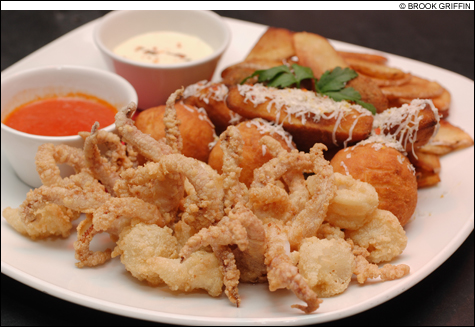
STEPPING UP: Sagra is better than the previous two restaurants in this space. |
This is my third trip to this space in as many years. Sauce and 400 Highland were pretty good restaurants, but crashed on the shoals of ambition or rent. Sagra is even better, with some novel Italian specialties and well-executed classics, priced below the North End standard. Will it last? I don’t know, but I hope so. It’s still a loud room, with odd but intriguing spaces created by a raised level and three bars. What was art-moderne gray at 400 Highland is now steakhouse-style red and black, with exposed brick and steel beams. The flooring and tables are dark wood, and the overall lighting seems to be improved.
The bread basket holds slices of an addictive focaccia and a good, crusty Italian loaf. The spread is a deceptively light, herbed-ricotta blend. An order of marinated olives ($5) works well as an appetizer or a bar snack, and will satisfy several people. They’re done up in olive oil, fennel seeds, and sections of lemon. The knockouts here are the giant green ones, which are surprisingly mild and a good foil for the marinade flavors. Another appetizer option, Arancini di Sicilia ($6), is four deep-fried rice balls about the size of racquetballs. The centers are bursts of meat-cheese flavor, and the dip is a light but clean marinara sauce. Fried-food fiends will, of course, skip directly to the “Grand Melody” ($16), a medley of fried things: rice balls, fried potatoes, calamari ($9 à la carte), stuffed olives ($7 à la carte), and stuffed croquettes ($5 à la carte).

On the lighter side, a salad of bitter greens ($7) features radicchio and arugula inside big leaves of sweet Bibb lettuce, and is dressed with an effective, parmesan-cream dressing. Mussel soup ($7) is a fine bowl of plump steamed mussels and steamed grape tomatoes, with wonderful polenta croutons soaking up the broth. And Tuscan bean soup ($5) is rich and hearty, based on cannellini beans, minced vegetables, and ham. In Tuscany, this dish would typically have whole-grain farro as well, but this is a well-cooked and delicious soup.
Tagliatelle with mushroom ragù ($13) has the unmistakable chew of homemade pasta. The wide ribbons are complemented by thinly sliced porcini stems, a nice attention to visual effects. Of course, the flavor effects of porcini are already well known; these woodsy mushrooms, served in a light, meat gravy, are superb.
The most unusual entrée is Maiale due modi ($17), pork two ways. Anywhere else, this would be fresh and cured. But Sagra, for its first way, has come up with five spareribs in a style from Marches, in which they are spiced like lamb chops. The other way is as a homemade Italian sausage, but in the peppery style of Abruzzo. The garnish is a heap of peppery and garlicky sautéed broccoli rabe. Lamb chops ($19) also come two ways, but only in the cuts. One is a thick T-bone chop; the other is a shoulder chop, with more flavor but also a little tougher. The garnish here is a kind of salad of soft, grilled red bell peppers, black olives, and fresh basil.
Pesce spada grigliato e caponata ($17) is a nice swordfish steak served on a “caponata” of cubed peppers, eggplant, onion, tomatoes, and the unusual addition of potato. This caponata had too much salt and pepper for me, although the potatoes helped. The seafood risotto special ($16) was made with long-grain rice, rather than any of the famous varieties of Italian risotto rice, but the grains were distinct, slightly al dente, and bound with a creamy medium. Most of the seafood (littleneck clams, mussels in the shell) was added near the end, but tiny shrimp and squid were used to flavor the rice very nicely. Unlike other North End restaurants that jack up the cost of specials, it was priced fairly.
The wine list is almost all Italian, but has no vintage years. Many of the wines are inexpensive, although marked up; so this is less of an issue than if you were picking an expensive Barolo. You may come across something like Sangiovese Merlot Santa Christina Antinori ($28), which implies a “Super Tuscan” blend of French grapes in Chianti country to make a bigger wine than the traditional Chianti. But the label tells a different story: the blend is 90 percent sangiovese (the traditional main grape in the red Chianti blend) and only 10 percent merlot. The current vintage turns out to be 2005, but that’s fine for a relatively light, quaffable, and aromatic bottle. Sagra also has a full line of Italian aperitifs, such as Strega, Aperol, and Campari (but they are listed on the dessert menu). Decaf ($1.75) was excellent. However, ordering herbal tea ($2.50) resulted in an unfortunate race to get the bag into the cup of hot water.